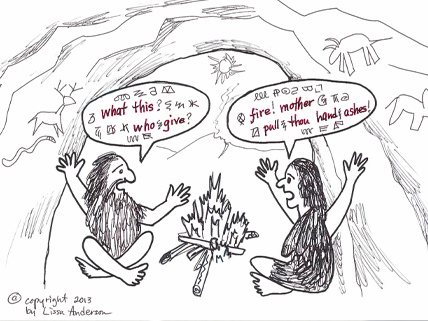You may have laughed at movies that show hairy Ice Age people grunting at each other while they paint their cave walls or hunt mastodons. That depiction is unfair, however, because people who lived thousands of years ago had fully developed language skills. What is really amazing is that people of that time may have been speaking some words that we would recognize today. A new linguistic study proposes that a handful of English words can be traced back 14,500 years!
To study development of physical traits, biologists trace changes in the DNA of plants and animals. Languages don’t have genes, though, so to learn about the history of languages, linguists have to study changes in cognates, which are basic words related to words in other languages due to common ancestry. Examples include name in English and nomen in Latin. By tracing predictable changes in cognates, researchers have dated many common words as far back as 9,000 years. Theorist Mark Pagel has pushed that date back another 5,500 years by using a totally different approach.
Pagel and his team built a statistical model based on cognates of the huge Indo-European language family, towhich the English language belongs. They examined the frequency of a word’s use and its part of speech to predict how long a word persisted through time. Most words, the researchers found, have about a 50 percent chance of being replaced by a completely new word every 2,000 to 4,000 years. Some words, however, they found to be replaced only every 10,000 to 20,000 years. The team members listed 23 words that they feel have the same meaning and nearly the same sound today as they did thousands of years ago. The words are: thou, I, not, that, we, to give, who, this, what, man/male, ye, old, mother, to hear, hand, fire, to pull, black, to flow, bark, ashes, to spit, worm.
Pagel’s proposal is not accepted widely, though, and we can’t go back to the Ice Age to strike up a conversation with our ancestors. So, historical linguists will continue to chew on the theory like a cave man gnawing on a mastodon bone.
Image credit: © copyright by Lissa Anderson, 2013
Related Links
- English May Have Retained Words from an Ice Age Language
Get the basics about Mark Pagel’s theory here.
(Source: American Association for the Advancement of Science, May 6, 2013) - Ice Age Words Stand the Test of Time
Learn why some words are “ultra-conserved.”
(Source: ABC Science, May 8, 2013) - Indo-European Languages Map Back to Turkey
Read another theory shaking up the world of historical linguistics.
(Source: ABC Science, August 24, 2012)





be a leader .
so starling
Dang it Carly did you do this for a current event too. :'(
i. Ikl. The. Books
I like this book lol so cool
hi,what does this mean
brooooo…